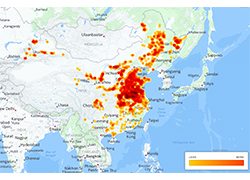Improving Environmental Governance in Developing Countries
Researcher: Junjie Zhang (UC San Diego)
Location: China

Epidemiological evidence consistently shows that particulate matter (PM) pollution is associated with elevated risks of morbidity and mortality. Fine particles with aerodynamic equivalent diameter of less than 2.5 microns (PM2.5) are particularly harmful. Due to technological and budget constraints, most developing countries have not established a national network to monitor fine particulate pollution. Even if ground-based measurements are available in the major cities, their monitoring stations are sparsely located, which leads to large estimation errors.
To improve the estimation of PM2.5 pollution exposure, this project incorporates ground-based measurements with satellite-retrieved Aerosol Optical Depth (AOD). The spatial interpolated PM2.5 levels are merged with population information, land cover, and economic activities at a fine spatial and temporal resolution. Using this strategy, we assess China's potential population exposure to PM2.5 at the sub-district level, the smallest administrative unit with public demographic information.
Preliminary results show that about 1,322 million people, or 98.6 percent of the total population, are exposed to PM2.5 levels above the World Health Organization’s daily guideline for longer than half a year.
Related Publications
Information about related publications here
Datasets
Links to related datasets here

